Archive for the 'Urdu Translation' Category
March 18, 2021
A Concise Guide to Urdu Grammar
Edgar Allan Poe believed, "A man’s grammar, like Caesar’s wife, should not only be pure, but above suspicion of impurity."
If you want to sanctify your Urdu grammar, you’re in the right place.
The structure of every language hinges upon its grammar. Having a basic understanding of a language’s grammar allows learners to fine-tune their listening comprehension and use the language clearly and accurately.
On this page, UrduPod101.com will inspire you to learn Urdu grammar in full by providing you with comprehensive overviews of the Urdu grammar basics and showing you how everything falls together.
Table of Contents
The Urdu Script and Transliteration System
Urdu Syntax and Word Order
Verbs and Tenses
Nouns
Pronouns
... Show more
March 4, 2021
The Top 30 Urdu Quotes for Language Learners
Have you ever encountered a quote that moved you to think more deeply about something or motivated you to start walking another path in life? Quotes can be very influential, spurring individuals and even entire communities into action.
Quotes from different language backgrounds reflect the socio-cultural norms and values of different nations. Luckily for you as a language learner, the Urdu language in particular is quite rich in the field of quotes, with many Pakistani people opting to express themselves through popular Urdu quotes when the situation allows for it.
In this article, you’ll learn a variety of Urdu quotes on life, as well as life’s many aspects and experiences.
Are you ready? Then let’s get to it.
Table of... Show more
July 31, 2020
The Ultimate Guide to Urdu Time: How to Tell Time in Urdu
It’s a universally acknowledged truth that time and tide wait for none. Yes, if you want to enjoy a good productive stay in an Urdu-speaking country, knowing how to effectively communicate time will be your vantage point. In this article, we’ll teach you everything you need to know about Urdu time so you can be prepared and on time, all the time!
P.S.: Once you’ve gotten the hang of telling the time in Urdu, be sure to check out our vocabulary list Talking about Days for more useful words and phrases.
Table of Contents
Why is it Important to Study How to Tell the Time in Urdu?
How to Ask the Time in Urdu
The Hours in Urdu
Understanding How to Use Minutes in Urdu
General Time Reference of the Day
Adverbs of Time... Show more
December 20, 2019
The Urdu Calendar: Talking About Dates in Urdu
Did you know there are many different types of calendars?
As you probably know - a calendar is a system of organizing days in weeks and months for specific purposes, according to Wikipedia.
Worldwide, most countries use the Gregorian calendar. Some just work on the same framework, meaning that time is divided into units based on the earth's movement around the sun - the "solar calendar". Other calendars keep time by observing the moon's movements, a combination of the moon and the sun's movements, and seasons.
Through UrduPod101, you can learn all about this and so much more! Our themed, culturally relevant lessons are skillfully designed so you can do your planning perfectly for a holiday or a date.
Having a good plan for a visit or... Show more
November 21, 2019
A Set of Urdu Travel Phrases to Make Your Tour Awesome
The reasons behind your journey to Pakistan may vary but the significance of our set of Urdu travel phrases does not. Regardless of the factors that have triggered your travel, you will find these Urdu phrases for travelers highly beneficial.
Whether the growing Pakistani business sector has attracted you or the developing tourism industry of Pakistan, your need to equip yourself with some easy Urdu travel phrases and selected Urdu travel words remains unaltered as these can make your stay productively enjoyable.
In this article, you will learn about some inevitable basic Urdu travel phrases along with a list of travel words in English and Urdu. It will also guide you about certain must-know Urdu travel words and phrases that can... Show more
December 26, 2017
How to Say Happy New Year in Urdu & New Year Wishes
Learn all the Urdu New Year wishes online, in your own time, on any device! Join UrduPod101 for a special Urdu New Year celebration!
Can you relate to the year passing something like this: “January, February, March - December!”? Many people do! Quantum physics teaches us that time is relative, and few experiences illustrate this principle as perfectly as when we reach the end of a year. To most of us, it feels like the old one has passed in the blink of an eye, while the new year lies ahead like a very long journey! However, New Year is also a time to celebrate beginnings, and to say goodbye to what has passed. This is true in every culture, no matter when New Year is celebrated.
So, how do you say Happy New Year in Urdu? Let a... Show more
November 27, 2017
How To Say ‘Thank you’ in Urdu
In most cultures, it is custom to express gratitude in some way or another. The dictionary defines gratitude as follows: it is “the quality of being thankful; readiness to show appreciation for and to return kindness”. Giving a sincere, thankful response to someone’s actions or words is often the ‘glue’ that keeps relationships together. This is true in most societies! Doing so in a foreign country also shows your respect and appreciation for the culture. Words have great power - use these ones sincerely and often!
Table of Contents
12 Ways to say ‘Thank you’ in Urdu
Video Lesson: Learn to Say ‘Thank You’ in 3 Minutes
Infographic & Audio Lesson: Survival Phrases - Thank You
Video Lesson: ‘Thank You’ in 31... Show more









